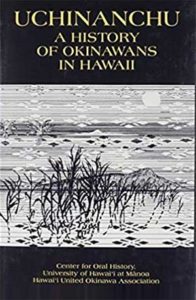
(copyright 1981, used by permission)
Life on the Plantation for the First Arrivals

Amazon »
They were all sent to Ewa Plantation. Soon, these men found life on the plantation extremely hard, in spite of their youthful vigor. Long, continuous hours of work – 10 hours a day-except for a 30 minute break for lunch. (Though the work was hard), it was harder to endure the extremely humiliating experience, which they never anticipated to encounter, of close supervision by the luna or overseer who had a rope in his hand, usually swinging it in the air to use it for whipping if anyone appeared to be lazy or disobedient.
Interviewed by the Reverend Jikai Yamasato of Jikoen Hongwanji, Chinzen Kinjo, the last surviving member of the first Okinawan group. Kinjo live in Hawaii until his death on August 10, 1962 at the age of 88. He describe life on the plantation as follows:
The life on Ewa Plantation was very hard; getting up at 4 am, breakfast at 5, starting work at 6, and working all day under the blazing sun. We worked like horses, moving mechanically under the whipping hands of the luna. There is no such thing as human sentiment. At night, instead of a sweet dream of my wife and child left in Okinawa, I was wakened up frightened by the nightmare of being whipped by the luna. Because of the perpetual feel of this unbearable whippin, some other worker committed suicide by hanging or jumping in front of the on-coming train. Fortunately, we Okinawans had been trained through ages to endure hardships caused by terrible typhoons. So, no one among us committed suicide.
There was no one who wasn’t whipped. Once when the luna whipped me by taking me for someone else, I was really mad and all the anger which had until then been suppressed in my exploded and I challenged him with karate. Since the luna was a big man, a six footer, it wasn’t easy for me. But finally, I threw him to the ground. I could have kicked him unconsciousness. There was a crowd surrounding us. Some cheered me, waving cane knives, shouting, ‘Kinjo, go ahead. Go ahead!’ The others shouted, ‘Beat him up; finish him!’ I was at the point of jumping on him, risking my whole life in the one blow. Right at that moment, a Big Luna came and calmed me down, saying, ‘Wait. Wait. I will fix everything all right.’ Thus the incident ended short of serious consequences. We wanted revenge even to the point of committing murder. You can understand how brutally the laborers of early years were treated.
